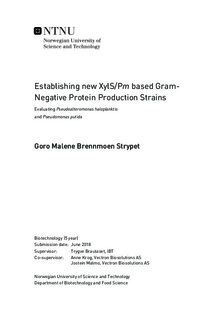| dc.description.abstract | To date, Escherichia coli is the most used bacterial host for recombinant protein production. Some proteins are, however, hard to express in this species due to a reducing intracellular environment and inclusion body formation, among others. The aim of this study was to use the core technology of Vectron BioSolutions AS to establish functional XylS/Pm based expression vectors in species alternative to E. coli. The candidate species were the Gram-negative strains Pseudoalteromonas haloplanktis TAC125, of special interest for production of proteins at low temperatures, and Pseudomonas putida KT2440, relevant for high-level production of recombinant protein.
In this study we report successful construction and integration of the pJB658/RK2 minimal replicon based vector pVB-1 mCherry-trfA_Kan with low, medium and high copy number in P. putida. High levels of soluble reporter protein (mCherry) was reported from the vector with medium copy number in P. putida. Compared to E. coli DH5α harboring the same vector, a three-fold increase in expression level was reported for the medium copy number and ~two-fold higher than for the high copy number mutant in E. coli. The low and high copy number mutants reported low expression levels of mCherry in P. putida. Around 95 % of the protein produced from the medium copy number mutant was soluble, comparable to ~50 % for E. coli.
For P. haloplanktis, extensive background studies were conducted to map properties important for working with the strain in the lab. Based on these, an expression vector pVB-1 mCherry-wt-ARS_Cm, harboring a Chloramphenicol selection marker and autonomously replicating sequence (ARS) originally from the P. haloplanktis plasmid pMtBL was attempted constructed. This was not managed within the time frame of this project. Nonetheless will the acquired insights and knowledge about the nature of the species facilitate further work for establishment of vectors expressing recombinant proteins from the XylS/Pm expression cassette.
With the integration of an expression vector with a medium copy number and successful production of mCherry, P. putida is again regarded as a promising candidate of interest for high-levels protein production in Vectron. No protein production results were obtained for P. haloplanktis, but a robust fundament for future work has been made. The species is still highly interesting as a potential expression host, due to its remarkable abilities to grow to high cell densities at temperatures down to 5 °C, also reported in this study. | |

